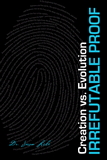Differences Between Humans and Animals
Originally published in Creation 17, no 4 (September 1995): 45.
Are there differences between humans and animals, or are we free to be animals like our evolutionary ancestors—as low-down as snakes, and to make pigs of ourselves, and to act like donkeys.
'No single, essential difference separates human beings from other animals.' So began a feature article on evolution in TIME magazine ('How Man Began', March 14, 1994). The more I thought about this sweeping statement the more I began to warm to it.
For example, like humans, apes have well formed rational faculties. Their ability to develop an argument, follow a line of logic, draw conclusions and frame hypotheses is quite remarkable.
Also like humans, apes have a marked faculty for language. (This, of course, is intertwined with their powers of reason.) Their vocabulary is enormous, their grammar complex, and their conversations deep and meaningful.
The apes' ability to codify language in writing is further proof of their close relationship to humans. In this respect, it was most gratifying to see the number of apes who wrote to TIME magazine in response to the article on 'How Man Began'. I was particularly interested to follow the line of reasoning of the orang-utan who argued that apes had evolved from humans, not vice versa.
Like humans, apes also have a strong spirit of inquiry. Their research in the fields of astronomy, mathematics, medicine and physics is noteworthy.
Apes also (again, like humans) yearn for meaning in life. This is why they devote so much of their time to philosophy, theology and ethics. The religious sentiments and practices of all apes can be traced back to their intense and endless quest for meaning.
Apes are concerned about questions not only of origin but also of destiny. The best proof I can offer for this claim is the maxim by one famous ape philosopher who said, 'Whether my life leads ultimately to the dirt or to the Judgment, either way, I've got a problem.'
Apes also have, like humans, a refined aesthetic sense. They admire beauty and long to surround themselves with it. When an ape cultivates a garden, puts flowers in a vase, or hangs up a painting, what is it doing if not expressing a love of beauty?
Again like humans, apes have a strong creative impulse. This is seen in their poetry, painting, dance, drama and music. To a lesser extent their creativity is also evident in the way they gather in weekly craft groups to weave baskets, spin wool, knit shawls, and cover photo albums.
The sense of humour shared by all apes is another proof of their close kinship to humans. Their delight in the ridiculous and their love of a good laugh is plain from the popular ape jokes they tell.
Reason, language, inquiry, wonder, longing, religion, morality, aesthetics, creativity, imagination, aspiration and humour ... such intangible but fundamental qualities are by no means unique to humans, as I hope I have conclusively shown. Therefore, in the profound words of TIME magazine: 'No single, essential difference separates human beings from other animals'.
This being the case, Christians are plainly wrong to insist that humans and animals are vastly different. And they are also obviously wrong to insist that this difference arises from the fact that God created us humans in His own likeness. And if they are wrong to insist that God made us in His own likeness, then they are wrong to insist that God has any claim on us.
Furthermore, if God has no claim on us, then we are free — free to be animals like our evolutionary ancestors—free to be as low-down as snakes, and to make pigs of ourselves, and to act like donkeys.
Did I say 'free'?
Hiss! Oink! Hee-haw!
Recommended Resources

Answers in Genesis is an apologetics ministry, dedicated to helping Christians defend their faith and proclaim the good news of Jesus Christ.
- Customer Service 800.778.3390
- Available Monday–Friday | 9 AM–5 PM ET
- © 2026 Answers in Genesis


